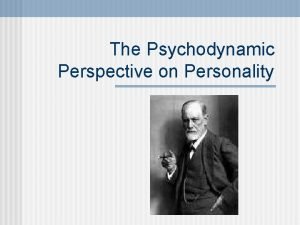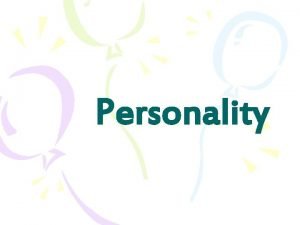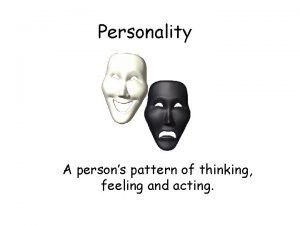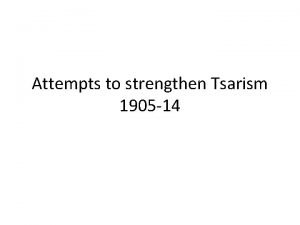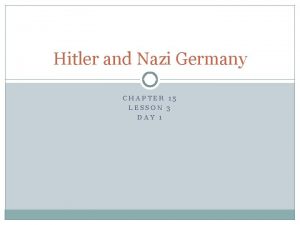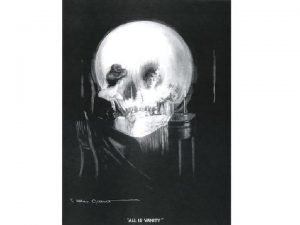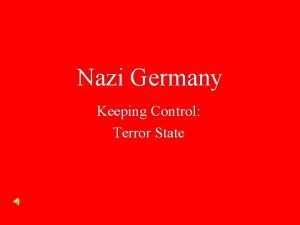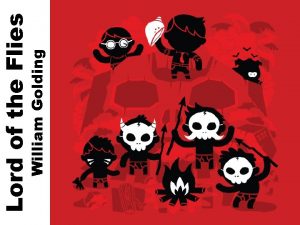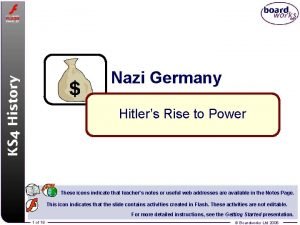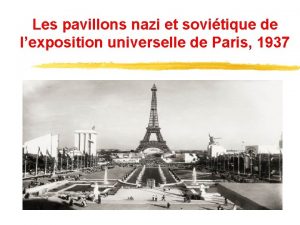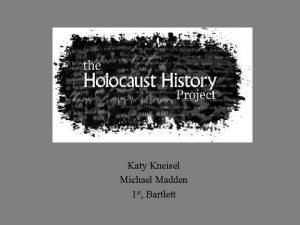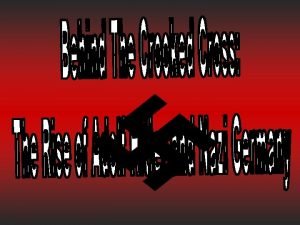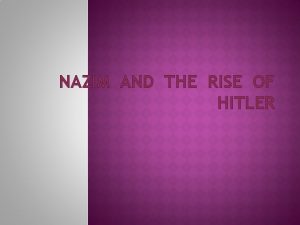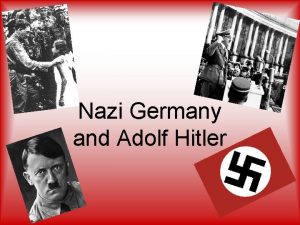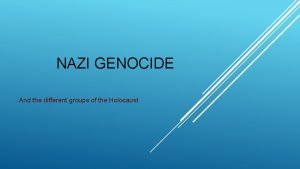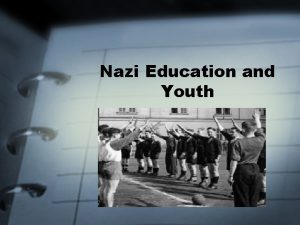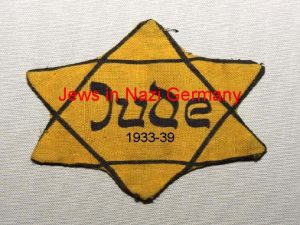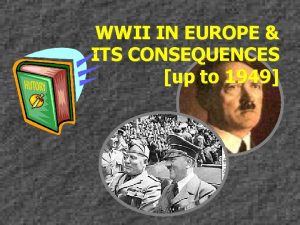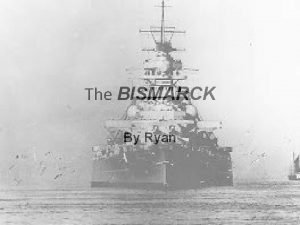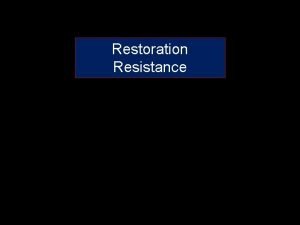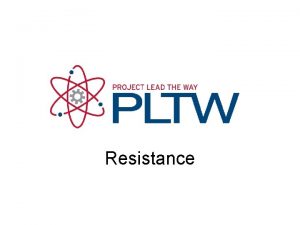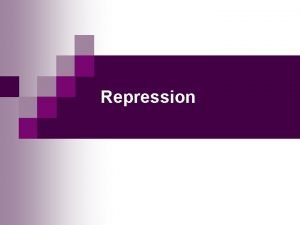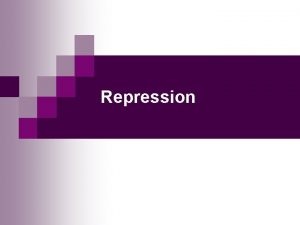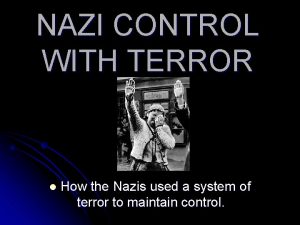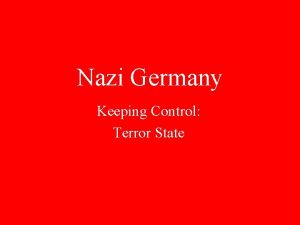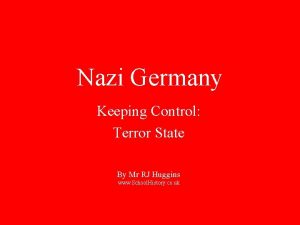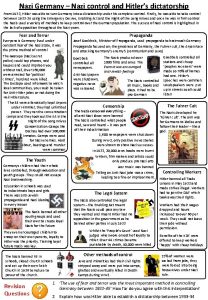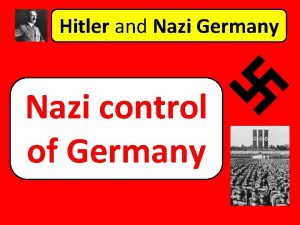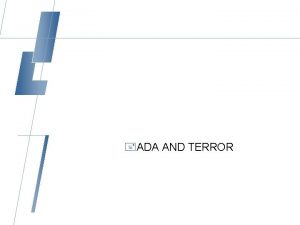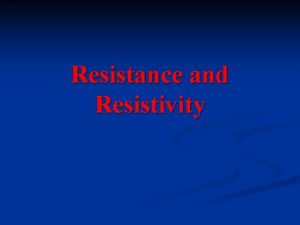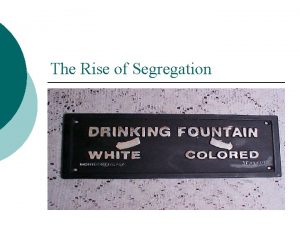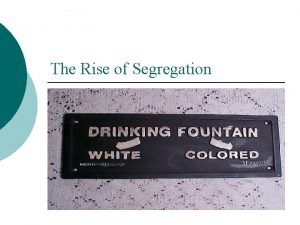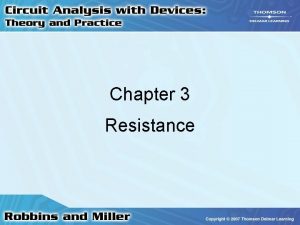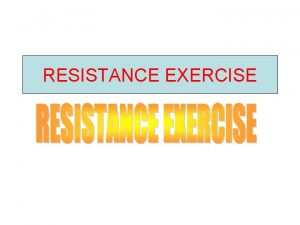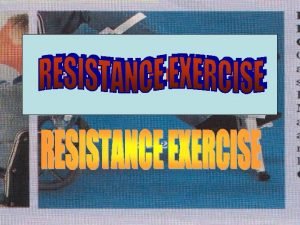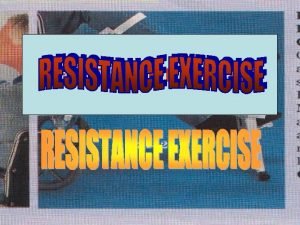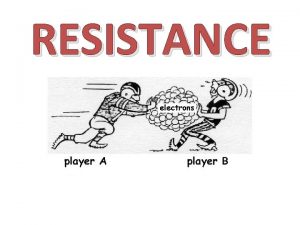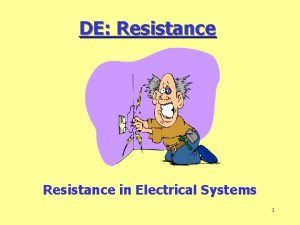Terror and Repression of Resistance Nazi Control of










![. . " " [3] [ 3 ] Nazi Control of Germany - Consent . . " " [3] [ 3 ] Nazi Control of Germany - Consent](https://slidetodoc.com/presentation_image/55553ec0d50053a6337cae75783502f0/image-11.jpg)




















- Slides: 31

Terror and Repression of Resistance

Nazi Control of Germany - Coercion • SS/Gestapo complex create a culture of fear and compliance in Germany. • Gestapo were the Prussian secret police that became the German secret police in 1933. • The SS were authorised to act as an extra police force in 1933 – they used the Reichstag Fire decree to take suspects into “protective custody”. • Both are powerful police forces in Germany, they overlap. Historians refer to them as the SS-Gestapo complex. • SA are the Nazi party bully boys used as a blunt instrument to smash opposition. • Block leaders and Radio wardens important to help keep control.

Gestapo • Initially seen as all powerful then research by Brozat suggested very small [30, 000 agents in total]. Gellately “under staffed, reactive organisation”. Many Gestapo had been detectives in Weimar – career policemen rather than convinced Nazis. • Evans disagrees and argues that campaign of terror was implemented by a wide range of agencies of coercion – 2 million Blockleaders, 3 million SA, Hitler Youth. He calls this an “uncoordinated but pervasive system of control. ”

Nazi Control of Germany - Coercion • Nazi control of Germany increased through a number of legal methods not just SS/Gestapo • Reichstag Fire February 1933 • Enabling Act March 1933 • Concordat with Catholic church • Free trade unions and political parties banned • Night of the Long Knives.

Nazi control of Germany • Gellately argues seizure of power in tune with what people want – terror used only on outsiders. He argues that the Gestapo were a relatively small secret police force and that they relied on denunciations from German people. He suggest Nazi Germany was “a plebiscitary dictatorship” [a dictatorship supported by the people] • Evans disagrees and sees terror as against big groups in society – working class and left wing organisations. Terror played a big part in securing power. People frightened into going along with Nazis.

Gellately • "I started to read these files about all the victims in just one region of Germany that the Gestapo had processed, " Gellately says. "It would have taken a large force of secret police to collect information on so many people. I needed to know just how many secret police there really were. So I asked an elderly gentleman who would've lived through those times, and he replied, 'They were everywhere!'" • That was the prevailing myth. • "But I had evidence right there in my hands that supported a different story, " Gellately explains. "There were relatively few secret police, and most were just processing the information coming in. I had found a shocking fact. It wasn't the secret police who were doing this wide-scale surveillance and hiding on every street corner. It was the ordinary German people who were informing on their neighbors. "

Views on Repression • Nikolaus Wachsmann takes the view that Hitler’s police apparatus commanded extensive weapons of repression. Fear of the Gestapo was widespread. The Gestapo drew extensively on support from outside its ranks. It used information and denunciations from paid informers, low-ranking party activists and state and municipal agencies, as well as the general public.

Views on Repression • Ian Kershaw takes the view that Resistance and opposition to Hitler acted without the active mass support of the population. Large proportions of the population did not even passively support the resistance but, rather, condemned it. Resistance was fragmented, atomised and isolated from any possibility of mass support. Opposition — real and potential — was crushed through theunprecedented level of repression by the Nazi state. • Evans “in the end, coercion was at least as important a propaganda in it’s impact on the behaviour of the vast majority”


Nazi Control of Germany - Consent • There is a school of thought that many Germans supported the Nazis and were not inclined to oppose or resist them. • This support some suggest is created or maintained by Nazi propaganda. This was driven by Goebbels and was everywhere. Posters, speeches, rallies and Radio ensured the Nazi message was given to the German people. • Consent was partially achieved through repression as each block of flats had a radio warden whose job it was to listen at flat doors to ensure people had the radio on when Hitler speeches were broadcast
![3 3 Nazi Control of Germany Consent . . " " [3] [ 3 ] Nazi Control of Germany - Consent](https://slidetodoc.com/presentation_image/55553ec0d50053a6337cae75783502f0/image-11.jpg)
. . " " [3] [ 3 ] Nazi Control of Germany - Consent • Kershaw talks about the importance of what he calls the Hitler Myth. • In this myth Hitler embodies all that is good in German history and is seen as a defender of Germany. People in Germany trust Hitler. This myth is given credence in Germany by the apparent economic miracle achieved under the Nazis. • People went along with the Nazis as they thought Hitler was good for Germany. • Albert Speer [a Nazi] suggests that as early as 1936 this Myth was having to be falsely engineered by the Nazis who bullied crowds into going along to Hitler speeches.

Nazi Control of Germany - Consent • Many Germans were willing to turn a blind eye to the worst parts of the Nazis in return for the economic growth and return of pride. • Zahn a banker in Germany in the 1930’s suggests “at the beginning you couldn’t whether national socialism was something good with a few bad side effects or something evil with a few good side effects. ” • Gotz Aly argues that improving material factors persuaded the vast majority of Germans to support Hitler and the Nazis.

Nazi Control of Germany - Consent • Popular policies also won support for the Nazis • Economic recovery was critical. People could turn a blind eye to the brutality of the Nazis as they saw Germany make an apparently miraculous economic recovery. • Foreign policy also won support as Hitler massively increased the size of the army and increasingly went against the T of V. Rhineland remilitarised in 1936, Anschluss in 1938. These foreign policy successes made many Germans proud of Germany again. Fits in to Hitler Myth. • Strength Through Joy, Hitler Youth, Volkswagen are other examples.

How widespread was opposition and resistance? • There is a debate over what counts as opposition – Peukert talks about “a pyramidical model of resistance”. • He suggests that there was limited outright resistance at the top of the pyramid [assassination attempts like Georg Esler in 1939 or Maurice Bauvaud in 1938]. • But he also suggests that there was widespread non-conformity at the base of this pyramid [Absenteeism, not giving Hitler salute, refusing to give to Winterhilfe]. • Evans suggests “most Germans ended up paying lip service to the regime”

How widespread was opposition and resistance? • Kershaw suggests that it is really hard for historians to measure the amount of opposition in Nazi Germany as evidence from the 1930’s is tainted by being from a totalitarian state and evidence from after is people trying to prove they weren’t a Nazi. • Hildenbrand argues that anti Nazi/Hitler jokes reflect “popular discontent” • Hiden “dissent and non-conformity widespread, resistance not” • Resistance underground therefore very hard to quantify. • Williamson Opposition hard as “German population by and large accepted Hitler”

How widespread was opposition and resistance?

Problems of Resistance

Problems of Resistance

Left wing Opposition - Socialist • SPD had been biggest party in Germany. • When “the Law against the formation of new parties” came in SPD were forced underground or into exile. • Leadership went to Prague and became SOPADE – tried to resist Nazis by publishing newspapers and getting information out of Germany. • Some underground SPD – Red Shock troops of about 3, 000 students but leaders arrested by 1934. • George Esler a Socialist attemted to blow Hitler up in Nov 1939.

Left wing Opposition - Communist • Biggest political opponents of Nazis. • 150, 000 in concentration camps, 30, 000 executed by 1945. • Based in cities and has limited success. Red Orchestra. • To start with 1 million leaflets 34/35 but too many arrested. • Strategy changes to factory groups – word of mouth, sabotage. Limited success • Kirk “working class contained rather than integrated”

Left wing Opposition

Church Resistance

Church Resistance

Church Resistance

Church Resistance

Church Resistance

Army Opposition

Army Opposition

Army Opposition

Army Opposition

Army Opposition
 Example of repression defense mechanism
Example of repression defense mechanism Main personality traits
Main personality traits Repression psychology
Repression psychology Stolypin repression
Stolypin repression Constant rate filtration example
Constant rate filtration example Force of air resistance
Force of air resistance Lesson 3 hitler and nazi germany
Lesson 3 hitler and nazi germany Sex boutique london
Sex boutique london William golding nazi
William golding nazi William golding fun facts
William golding fun facts Nazi partys
Nazi partys Dasbus
Dasbus Military brotherhood tattoos
Military brotherhood tattoos Nazi germany
Nazi germany William golding facts
William golding facts Nazi germany military
Nazi germany military William golding nazi
William golding nazi Imagen de nazi
Imagen de nazi Le pavillon nazi
Le pavillon nazi Henry madden nazi
Henry madden nazi Nazi party
Nazi party Nazi
Nazi Nazi germany
Nazi germany Nazi fuck
Nazi fuck Nazi fuck
Nazi fuck V3million
V3million Nazi
Nazi Nazi
Nazi 8 stages of the cambodian genocide
8 stages of the cambodian genocide Nazi
Nazi Arditi knives
Arditi knives Jeopardy bizmark
Jeopardy bizmark
